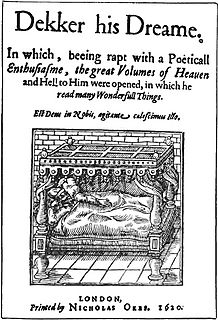Related Research Articles

Thomas Middleton was an English Jacobean playwright and poet. Middleton stands with John Fletcher and Ben Jonson among the most successful and prolific of the playwrights at work during the Jacobean period. He was among the few to achieve equal success in comedy and tragedy, and a prolific writer of masques and pageants.

Thomas Dekker was an English Elizabethan dramatist and pamphleteer, a versatile and prolific writer, whose career spanned several decades and brought him into contact with many of the period's most famous dramatists.
William Rowley was an English Jacobean dramatist, best known for works written in collaboration with more successful writers. His date of birth is estimated to have been c. 1585; he was buried on 11 February 1626 in the graveyard of St James's, Clerkenwell in north London.

John Ford was an English playwright and poet of the Jacobean and Caroline eras born in Ilsington in Devon, England.

The London Prodigal is a play in English Renaissance theatre, a city comedy set in London, in which a prodigal son learns the error of his ways. The play was published in quarto in 1605 by the stationer Nathaniel Butter, and printed by Thomas Creede. In 1664 it was one of the seven plays that publisher Philip Chetwinde added to the second impression of his Third Folio of Shakespeare's plays.

John Fletcher (1579–1625) was a Jacobean playwright. Following William Shakespeare as house playwright for the King's Men, he was among the most prolific and influential dramatists of his day; during his lifetime and in the early Restoration, his fame rivalled Shakespeare's. He collaborated on writing plays with Francis Beaumont, and also with Shakespeare on two plays.

The Merry Devil of Edmonton is an Elizabethan-era stage play; a comedy about a magician, Peter Fabell, nicknamed the Merry Devil. It was at one point attributed to William Shakespeare, but is now considered part of the Shakespeare Apocrypha.

Blurt, Master Constable is a late Elizabethan comedy, interesting for the authorship problem it presents.
Lust's Dominion, or The Lascivious Queen is an English Renaissance stage play, a tragedy written perhaps around 1600, probably by Thomas Dekker in collaboration with others and first published in 1657.
Poetaster is a late Elizabethan satirical comedy written by Ben Jonson that was first performed in 1601. The play formed one element in the back-and-forth exchange between Jonson and his rivals John Marston and Thomas Dekker in the so-called Poetomachia or War of the Theatres of 1599–1601.
Cynthia's Revels, or The Fountain of Self-Love is a late Elizabethan stage play, a satire written by Ben Jonson. The play was one element in the Poetomachia or War of the Theatres between Jonson and rival playwrights John Marston and Thomas Dekker.
Perkin Warbeck is a Caroline era history play by John Ford. It is generally ranked as one of Ford's three masterpieces, along with 'Tis Pity She's a Whore and The Broken Heart. T. S. Eliot went so far as to call Perkin Warbeck "unquestionably Ford's highest achievement...one of the very best historical plays outside of the works of Shakespeare in the whole of Elizabethan and Jacobean drama."
Love's Sacrifice is a Caroline era stage play, a tragedy written by John Ford, and first published in 1633. It is one of Ford's three surviving solo tragedies, the others being The Broken Heart and 'Tis Pity She's a Whore.
A Contention for Honor and Riches is a Caroline era stage play, a short drama or interlude written by James Shirley and first published in 1633. Generally classed as a morality play, it illustrates the continuing influence of archaic forms of drama on the relatively "sophisticated" or even "decadent" theatre of the Caroline era.
Cupid and Death is a mid-seventeenth-century masque, written by the Caroline era dramatist James Shirley, and performed on 26 March 1653 before the Portuguese ambassador to Great Britain. The work and its performance provide a point of contradiction to the standard view that the England of Oliver Cromwell and the Interregnum was uniformly hostile to stage drama.
The Fairy Knight, or Oberon the Second is an early Stuart era stage play, a comedy of uncertain and problematic authorship. Never published in its historical period, the play existed only in a manuscript, which is now MS. V.a.128 in the collection of the Folger Shakespeare Library in Washington, D.C.
George Eld was a London printer of the Jacobean era, who produced important works of English Renaissance drama and literature, including key texts by William Shakespeare, Ben Jonson, Christopher Marlowe, and Thomas Middleton.
Nicholas Okes was an English printer in London of the Jacobean and Caroline eras, remembered for printing works of English Renaissance drama. He was responsible for early editions of works by many of the playwrights of the period, including William Shakespeare, Ben Jonson, John Webster, Thomas Middleton, Thomas Dekker, Thomas Heywood, James Shirley, and John Ford.
Andrew Pennycuicke was a mid-seventeenth-century actor and publisher; he was responsible for publishing a number of plays of English Renaissance drama.
The Cruelty of the Spaniards in Peru was an innovative 1658 theatrical presentation, a hybrid entertainment or masque or "operatic show", written and produced by Sir William Davenant. The music was composed by Matthew Locke.
References
- Logan, Terence P., and Denzell S. Smith, eds. The Later Jacobean and Caroline Dramatists: A Survey and Bibliography of Recent Studies in English Renaissance Drama. Lincoln, NE, University of Nebraska Press, 1978.
- Stavig, Mark. John Ford and the Traditional Moral Order. Madison, WI, University of Wisconsin Press, 1968.
- Waith, Eugene M. Patterns and Perspectives in English Renaissance Drama. Newark, DE, University of Delaware Press, 1988.

